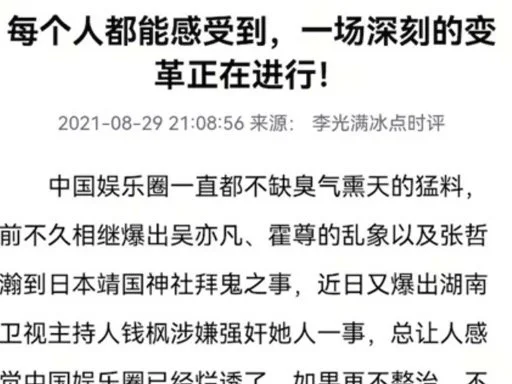Lessons of history
April 20, 2021
I MEET “Wang”, a Shanghai government official, and we have the usual long conversation that veers randomly from the personal to the political. We end up talking about Xinjiang.
The official insists the controversial facilities in Xinjiang are not forced labour camps at all but mere training centres designed specifically to improve the “productivity” and earning potential of local Uyghurs. Wang shows no sign at all of having doubt in his mind that what he is saying is true. But then he admits China’s complaints about the BBC’s recent coverage are not so much about inaccuracies, but about its one-sidedness.
I concede that the British media in general and the BBC in particular is motivated by the need to produce negative reporting, so as to demonstrate that it is not a propaganda vehicle churning out good vibes for the benefit of the government. Considering its recent record in Britain, however, this no longer quite rings true. Its journalists, it has to be said, are also motivated by personal ambition and the need to be seen speaking truth to power. It is important for a star foreign correspondent like John Sudworth to treat governments without fear or favour. China, which does not tolerate any sort of press freedom and thinks nothing of deploying thugs to interfere with reporting, offers a particularly eye-catching opportunity to show off one’s courage in front of an international audience.
China, now more sensitive to criticism than ever, continues to see old Edgar Snow as its ideal foreign correspondent. Snow famously interviewed Chairman Mao for two long and mostly rose-tinted books about “Red China”, but is now widely regarded as a “useful idiot” who failed to notice either the depredations of the Great Leap Forward or the horrors of the Cultural Revolution.
Wang asked if any of my editors outside China ever put pressure on me to distort my reporting. Without mentioning the fact that any such pressures were negligible compared to the crude censorship that local journalists face, I said that editors often had preconceptions about China, but generally they would never impose them on our story if we told them that they were wrong.
Wang asked where these preconceptions came from, and I said that virtually every country had preconceptions about every other country. Quite a few ordinary Chinese people still seem to think of Britain as some hidebound bastion of tradition and aristocracy, swaddled in post-war smog and dressed in pinstriped suits.
What I didn’t mention were the preconceptions that many Chinese have towards the Uyghurs. Where do they come from? Like anywhere else, they have been shaped and reinforced by history, and by centuries of violent interaction. They support the prevailing Han Chinese view of Xinjiang as a hostile force that poses a material threat to the nation and needs to be pacified at any cost. These fears shape China’s behaviour, which in turn shapes the Uyghur response. Tensions escalate accordingly.
Alas, China is generally not permitted to contemplate the possibility that the problems in Xinjiang did not merely emerge ex nihilo, but were actually the concrete products of China’s own policy decisions. One fears that China simply doesn’t have the means to reflect properly on its history, or to accept any alternative views. In China, truth is not something to be contested, but something decided by the leadership and imposed from above, with punishments meted out for even the slightest deviation. “Incorrect” interpretations of the past are branded as “historical nihilism”. The Party line now stretches back centuries, and is certainly long enough to cover the decisions made three or four hundred years ago in Xinjiang by Qing-era warlords and Sufi insurrectionists.
Soon it will be the hundredth anniversary of the Chinese Communist Party. Wang said there would of course be events here in Shanghai, where the Party’s first ever meeting was held. As a matter of politeness I told him we would certainly be happy to join a government tour of old Communist haunts, and would also love to speak to some old Party veterans, should any be made available.
But we know that everything they are allowed to say to us will have been arranged in advance. Any possibility of dissention from the Party line will have been painstakingly, comprehensively eliminated. All we will hear, more or less, is the inevitability of the Party’s victory, and its unshakeable position at the vanguard of the Chinese people’s spiritual and historical awakening.
Even before it has happened, it already feels like a lost opportunity to look back objectively on the Party and its occasionally catastrophic missteps over the years. It is a shame that the only competing opinions will come from gobby foreigners and other “anti-Chinese elements”.
Will this intolerance of dissent damage China in the long term? People in the West like to believe that China’s resolute anti-pluralism will eventually hold back its growth. At this point, I reach for that old Christopher Hitchens line about how the totalitarian is in danger of becoming the utilitarian.
If there turns out to be a connection between the utilitarian and the totalitarian, then we wretched mammals are in even worse straits than we suspect.






